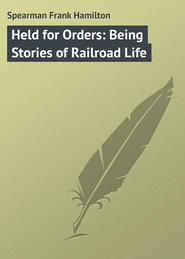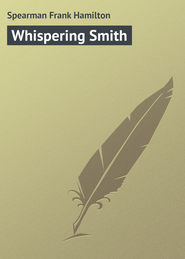По всем вопросам обращайтесь на: info@litportal.ru
(©) 2003-2024.
✖
Nan of Music Mountain
Автор
Год написания книги
2017
Настройки чтения
Размер шрифта
Высота строк
Поля
Nan of Music Mountain
Frank Spearman
Frank H. Spearman
Nan of Music Mountain
CHAPTER I
FRONTIER DAY
Lefever, if there was a table in the room, could never be got to sit on a chair; and being rotund he sat preferably sidewise on the edge of the table. One of his small feet–his feet were encased in tight, high-heeled, ill-fitting horsemen’s boots–usually rested on the floor, the other swung at the end of his stubby leg slowly in the air. This idiosyncrasy his companion, de Spain, had learned to tolerate.
But Lefever’s subdued whistle, which seemed meditative, always irritated de Spain more or less, despite his endeavor not to be irritated. It was like the low singing of a tea-kettle, which, however unobtrusive, indicates steam within. In fact, John Lefever, who was built not unlike a kettle, and whose high, shiny forehead was topped by a pompadour shock of very yellow hair, never whistled except when there was some pressure on his sensibilities.
The warm sun streaming through the windows of the private office of the division superintendent at Sleepy Cat, a railroad town lying almost within gunshot of the great continental divide, would easily have accounted for the cordial perspiration that illumined Lefever’s forehead. Not that a perspiration is easily achieved in the high country; it isn’t. None, indeed, but a physical giant, which Lefever was, could maintain so constant and visible a nervous moisture in the face of the extraordinary atmospheric evaporation of the mountain plateaus. And to de Spain, on this occasion, even the glistening beads on his companion’s forehead were annoying, for he knew that he himself was properly responsible for their presence.
De Spain, tilted back in the superintendent’s chair, sat near Lefever–Jeffries had the mountain division then–his elbows resting on the arms of the revolving-chair, and with his hands he gripped rather defiantly the spindles supporting them; his feet were crossed on the walnut rim of the shabby, cloth-topped table. In this attitude his chin lay on his soft, open collar and tie, his sunburnt lips were shut tight, and above and between his nervous brown eyes were two little, vertical furrows of perplexity and regret. He was looking at the dull-finish barrel of a new rifle, that lay across Lefever’s lap. At intervals Lefever took the rifle up and, whistling softly, examined with care a fracture of the lever, the broken thumb-piece of which lay on the table between the two men.
From the Main Street side of the large room came the hooting and clattering of a Frontier Day celebration, and these noises seemed not to allay the discomfort apparent on the faces of the two men.
“It certainly is warm,” observed Lefever, apropos of nothing at all.
“Why don’t you get out of the sun?” suggested de Spain shortly.
Lefever made a face. “I am trying to keep away from that noise.”
“Hang it, John,” blurted out de Spain peevishly, “what possessed you to send for me to do the shooting, anyway?”
His companion answered gently–Lefever’s patience was noted even among contained men–“Henry,” he remonstrated, “I sent for you because I thought you could shoot.”
De Spain’s expression did not change under the reproach. His bronzed face was naturally amiable, and his mental attitude toward ill luck, usually one of indifference, was rarely more than one of perplexity. His features were so regular as to contribute to this undisturbed expression, and his face would not ordinarily attract attention but for his extremely bright and alive eyes–the frequent mark of an out-of-door mountain life–and especially for a red birthmark, low on his left cheek, disappearing under the turn of the jaw. It was merely a strawberry, so-called, but an ineradicable stamp, and perhaps to a less preoccupied man a misfortune. Henry de Spain, however, even at twenty-eight, was too absorbed in many things to give thought to this often, and after knowing him, one forgot about the birthmark in the man that carried it. Lefever’s reproach was naturally provocative. “I hope now,” retorted de Spain, but without any show of resentment, “you understand I can’t.”
“No,” persisted Lefever good-naturedly, “I only realize, Henry, that this wasn’t your day for the job.”
The door of the outer office opened and Jeffries, the superintendent, walked into the room; he had just come from Medicine Bend in his car. The two men rose to greet him. He asked about the noise in the street.
“That noise, William, comes from all Calabasas and all Morgan’s Gap,” explained Lefever, still fondling the rifle. “The Morgans are celebrating our defeat. They put it all over us. We were challenged yesterday,” he continued in response to the abrupt questions of Jeffries. “The Morgans offered to shoot us offhand, two hundred yards, bull’s-eye count. The boys here–Bob Scott and some of the stage-guards–put it up to me. I thought we could trim them by running in a real gunman. I wired to Medicine Bend for Henry. Henry comes up last night with a brand-new rifle, presented, I imagine, by the Medicine Bend Black Hand Local, No. 13. This is the gun,” explained Lefever feebly, holding forth the exhibit. “The lever,” he added with a patient expletive, “broke.”
“Give me the gun, John,” interposed de Spain resignedly. “I’ll lay it on the track to-night for a train to run over.”
“It was a time limit, you understand, William,” persisted Lefever, continuing to stick pins calmly into de Spain. “Henry got to shooting too fast.”
“That wasn’t what beat me,” exclaimed de Spain curtly. And taking up the offending rifle he walked out of the room.
“Nor was it the most humiliating feature of his defeat,” murmured Lefever, as the door closed behind his discomfited champion. “What do you think, William?” he grumbled on. “The Morgans ran in a girl to shoot against us–true as there’s a God in heaven. They put up Nan Morgan, old Duke Morgan’s little niece. And what do you think? She shot the fingers clean off our well-known Black Hand scout. I never before in my life saw Henry so fussed. The little Music Mountain skirt simply put it all over him. She had five bull’s-eyes to Henry’s three when the lever snapped. He forfeited.”
“Some shooting,” commented Jeffries, rapidly signing letters.
“We expected some when Henry unslung his gun,” Lefever went on without respecting Jeffries’s preoccupation. “As it is, those fellows have cleaned up every dollar loose in Sleepy Cat, and then some. Money? They could start a bank this minute.”
Sounds of revelry continued to pour in through the street window. The Morgans were celebrating uncommonly. “Rubbing it in, eh, John?” suggested Jeffries.
“Think of it,” gasped Lefever, “to be beaten by an eighteen-year-old girl.”
“Now that,” declared Jeffries, waking up as if for the first time interested, “is exactly where you made your mistake, John. Henry is young and excitable–”
“Excitable!” echoed Lefever, taken aback.
“Yes, excitable–when a girl is in the ring–why not? Especially a trim, all-alive, up-and-coming, blue-eyed hussy like that girl of Duke Morgan’s. She would upset any young fellow, John.”
“A girl from Morgan’s Gap?”
“Morgan’s Gap, nothing!” responded Jeffries scornfully. “What’s that got to do with it? Does that change the fire in the girl’s eye, the curve of her neck, the slope of her shoulder, John, or the color of her cheek?” Lefever only stared. “De Spain got to thinking about the girl,” persisted Jeffries, “her eyes and neck and pink cheeks rattled him. Against a girl you should have put up an old, one-eyed scout like yourself, or me, or Bob Scott.
“There’s another thing you forget, John,” continued Jeffries, signing even more rapidly. “A gunman shoots his best when there’s somebody shooting at him–otherwise he wouldn’t be a gunman–he would be just an ordinary, every-day marksman, with a Schuetzenverein medal and a rooster feather in his hat. That’s why you shoot well, John–because you’re a gunman, and not a marksman.”
“That boy can shoot all around me, Jeff.”
“For instance,” continued Jeffries, tossing off signatures now with a rubber stamp, and developing his incontestable theory at the same time, “if you had put Gale Morgan up against Henry at, say five hundred yards, and told them to shoot at each other, instead of against each other, you’d have got bull’s-eyes to burn from de Spain. And the Calabasas crowd wouldn’t have your money. John, if you want to win money, you must study the psychological.”
There was abundance of raillery in Lefever’s retort: “That’s why you are rich, Jeff?”
“No, I am poor because I failed to study it. That is why I am at Sleepy Cat holding down a division. But now that you’ve brought Henry up here, we’ll keep him.”
“What do you mean, keep him?” demanded Lefever, starting in protest.
“What do I mean?” thundered Jeffries, who frequently thundered even when it didn’t rain in the office. “I mean I need him. I mean the time to shoot a bear is when you see him. John, what kind of a fellow is de Spain?” demanded the superintendent, as if he had never heard of him.
“Henry de Spain?” asked Lefever, sparring innocently for time.
“No, Commodore George Washington, General Jackson, Isaac Watts de Spain,” retorted Jeffries peevishly. “Don’t you know the man we’re talking about?”
“Known him for ten years.”
“Then why say ‘Henry’ de Spain, as if there were a dozen of him? He’s the only de Spain in these parts, isn’t he? What kind of a fellow is he?”
Lefever was ready; and as he sat in a chair sidewise at the table, one arm flung across the green baize, he looked every inch his devil-may-care part. Regarding Jeffries keenly, he exclaimed with emphasis: “Why, if you want him short and sharp, he’s a man with a soft eye and a snap-turtle jaw, a man of close squeaks and short-arm shots, always getting into trouble, always getting out; a man that can wheedle more out of a horse than anybody but an Indian; coax more shots out of a gun than anybody else can put into it–if you want him flat, that’s Henry, as I size him.”
Jeffries resumed his mildest tone: “Tell him to come in a minute, John.”
De Spain himself expressed contemptuous impatience when Lefever told him the superintendent wanted him to go to work at Sleepy Cat. He declared he had always hated the town; and Lefever readily understood why he should especially detest it just now. Every horseman’s yell that rang on the sunny afternoon air through the open windows–and from up the street and down there were still a good many–was one of derision at de Spain’s galling defeat. When he at length consented to talk with Jeffries about coming to Sleepy Cat, the interview was of a positive sort on the one side and an obstinate sort on the other. De Spain raised one objection after another to leaving Medicine Bend, and Jeffries finally summoned a show of impatience.
“You are looking for promotion, aren’t you?” he demanded threateningly.
“Yes, but not for motion without the ‘pro,’” objected de Spain. “I want to stick to the railroad business. You want to get me into the stage business.”
“Temporarily, yes. But I’ve told you when you come back to the division proper, you come as my assistant, if you make good running the Thief River stages. Think of the salary.”
“I have no immediate heirs.”
Frank Spearman
Frank H. Spearman
Nan of Music Mountain
CHAPTER I
FRONTIER DAY
Lefever, if there was a table in the room, could never be got to sit on a chair; and being rotund he sat preferably sidewise on the edge of the table. One of his small feet–his feet were encased in tight, high-heeled, ill-fitting horsemen’s boots–usually rested on the floor, the other swung at the end of his stubby leg slowly in the air. This idiosyncrasy his companion, de Spain, had learned to tolerate.
But Lefever’s subdued whistle, which seemed meditative, always irritated de Spain more or less, despite his endeavor not to be irritated. It was like the low singing of a tea-kettle, which, however unobtrusive, indicates steam within. In fact, John Lefever, who was built not unlike a kettle, and whose high, shiny forehead was topped by a pompadour shock of very yellow hair, never whistled except when there was some pressure on his sensibilities.
The warm sun streaming through the windows of the private office of the division superintendent at Sleepy Cat, a railroad town lying almost within gunshot of the great continental divide, would easily have accounted for the cordial perspiration that illumined Lefever’s forehead. Not that a perspiration is easily achieved in the high country; it isn’t. None, indeed, but a physical giant, which Lefever was, could maintain so constant and visible a nervous moisture in the face of the extraordinary atmospheric evaporation of the mountain plateaus. And to de Spain, on this occasion, even the glistening beads on his companion’s forehead were annoying, for he knew that he himself was properly responsible for their presence.
De Spain, tilted back in the superintendent’s chair, sat near Lefever–Jeffries had the mountain division then–his elbows resting on the arms of the revolving-chair, and with his hands he gripped rather defiantly the spindles supporting them; his feet were crossed on the walnut rim of the shabby, cloth-topped table. In this attitude his chin lay on his soft, open collar and tie, his sunburnt lips were shut tight, and above and between his nervous brown eyes were two little, vertical furrows of perplexity and regret. He was looking at the dull-finish barrel of a new rifle, that lay across Lefever’s lap. At intervals Lefever took the rifle up and, whistling softly, examined with care a fracture of the lever, the broken thumb-piece of which lay on the table between the two men.
From the Main Street side of the large room came the hooting and clattering of a Frontier Day celebration, and these noises seemed not to allay the discomfort apparent on the faces of the two men.
“It certainly is warm,” observed Lefever, apropos of nothing at all.
“Why don’t you get out of the sun?” suggested de Spain shortly.
Lefever made a face. “I am trying to keep away from that noise.”
“Hang it, John,” blurted out de Spain peevishly, “what possessed you to send for me to do the shooting, anyway?”
His companion answered gently–Lefever’s patience was noted even among contained men–“Henry,” he remonstrated, “I sent for you because I thought you could shoot.”
De Spain’s expression did not change under the reproach. His bronzed face was naturally amiable, and his mental attitude toward ill luck, usually one of indifference, was rarely more than one of perplexity. His features were so regular as to contribute to this undisturbed expression, and his face would not ordinarily attract attention but for his extremely bright and alive eyes–the frequent mark of an out-of-door mountain life–and especially for a red birthmark, low on his left cheek, disappearing under the turn of the jaw. It was merely a strawberry, so-called, but an ineradicable stamp, and perhaps to a less preoccupied man a misfortune. Henry de Spain, however, even at twenty-eight, was too absorbed in many things to give thought to this often, and after knowing him, one forgot about the birthmark in the man that carried it. Lefever’s reproach was naturally provocative. “I hope now,” retorted de Spain, but without any show of resentment, “you understand I can’t.”
“No,” persisted Lefever good-naturedly, “I only realize, Henry, that this wasn’t your day for the job.”
The door of the outer office opened and Jeffries, the superintendent, walked into the room; he had just come from Medicine Bend in his car. The two men rose to greet him. He asked about the noise in the street.
“That noise, William, comes from all Calabasas and all Morgan’s Gap,” explained Lefever, still fondling the rifle. “The Morgans are celebrating our defeat. They put it all over us. We were challenged yesterday,” he continued in response to the abrupt questions of Jeffries. “The Morgans offered to shoot us offhand, two hundred yards, bull’s-eye count. The boys here–Bob Scott and some of the stage-guards–put it up to me. I thought we could trim them by running in a real gunman. I wired to Medicine Bend for Henry. Henry comes up last night with a brand-new rifle, presented, I imagine, by the Medicine Bend Black Hand Local, No. 13. This is the gun,” explained Lefever feebly, holding forth the exhibit. “The lever,” he added with a patient expletive, “broke.”
“Give me the gun, John,” interposed de Spain resignedly. “I’ll lay it on the track to-night for a train to run over.”
“It was a time limit, you understand, William,” persisted Lefever, continuing to stick pins calmly into de Spain. “Henry got to shooting too fast.”
“That wasn’t what beat me,” exclaimed de Spain curtly. And taking up the offending rifle he walked out of the room.
“Nor was it the most humiliating feature of his defeat,” murmured Lefever, as the door closed behind his discomfited champion. “What do you think, William?” he grumbled on. “The Morgans ran in a girl to shoot against us–true as there’s a God in heaven. They put up Nan Morgan, old Duke Morgan’s little niece. And what do you think? She shot the fingers clean off our well-known Black Hand scout. I never before in my life saw Henry so fussed. The little Music Mountain skirt simply put it all over him. She had five bull’s-eyes to Henry’s three when the lever snapped. He forfeited.”
“Some shooting,” commented Jeffries, rapidly signing letters.
“We expected some when Henry unslung his gun,” Lefever went on without respecting Jeffries’s preoccupation. “As it is, those fellows have cleaned up every dollar loose in Sleepy Cat, and then some. Money? They could start a bank this minute.”
Sounds of revelry continued to pour in through the street window. The Morgans were celebrating uncommonly. “Rubbing it in, eh, John?” suggested Jeffries.
“Think of it,” gasped Lefever, “to be beaten by an eighteen-year-old girl.”
“Now that,” declared Jeffries, waking up as if for the first time interested, “is exactly where you made your mistake, John. Henry is young and excitable–”
“Excitable!” echoed Lefever, taken aback.
“Yes, excitable–when a girl is in the ring–why not? Especially a trim, all-alive, up-and-coming, blue-eyed hussy like that girl of Duke Morgan’s. She would upset any young fellow, John.”
“A girl from Morgan’s Gap?”
“Morgan’s Gap, nothing!” responded Jeffries scornfully. “What’s that got to do with it? Does that change the fire in the girl’s eye, the curve of her neck, the slope of her shoulder, John, or the color of her cheek?” Lefever only stared. “De Spain got to thinking about the girl,” persisted Jeffries, “her eyes and neck and pink cheeks rattled him. Against a girl you should have put up an old, one-eyed scout like yourself, or me, or Bob Scott.
“There’s another thing you forget, John,” continued Jeffries, signing even more rapidly. “A gunman shoots his best when there’s somebody shooting at him–otherwise he wouldn’t be a gunman–he would be just an ordinary, every-day marksman, with a Schuetzenverein medal and a rooster feather in his hat. That’s why you shoot well, John–because you’re a gunman, and not a marksman.”
“That boy can shoot all around me, Jeff.”
“For instance,” continued Jeffries, tossing off signatures now with a rubber stamp, and developing his incontestable theory at the same time, “if you had put Gale Morgan up against Henry at, say five hundred yards, and told them to shoot at each other, instead of against each other, you’d have got bull’s-eyes to burn from de Spain. And the Calabasas crowd wouldn’t have your money. John, if you want to win money, you must study the psychological.”
There was abundance of raillery in Lefever’s retort: “That’s why you are rich, Jeff?”
“No, I am poor because I failed to study it. That is why I am at Sleepy Cat holding down a division. But now that you’ve brought Henry up here, we’ll keep him.”
“What do you mean, keep him?” demanded Lefever, starting in protest.
“What do I mean?” thundered Jeffries, who frequently thundered even when it didn’t rain in the office. “I mean I need him. I mean the time to shoot a bear is when you see him. John, what kind of a fellow is de Spain?” demanded the superintendent, as if he had never heard of him.
“Henry de Spain?” asked Lefever, sparring innocently for time.
“No, Commodore George Washington, General Jackson, Isaac Watts de Spain,” retorted Jeffries peevishly. “Don’t you know the man we’re talking about?”
“Known him for ten years.”
“Then why say ‘Henry’ de Spain, as if there were a dozen of him? He’s the only de Spain in these parts, isn’t he? What kind of a fellow is he?”
Lefever was ready; and as he sat in a chair sidewise at the table, one arm flung across the green baize, he looked every inch his devil-may-care part. Regarding Jeffries keenly, he exclaimed with emphasis: “Why, if you want him short and sharp, he’s a man with a soft eye and a snap-turtle jaw, a man of close squeaks and short-arm shots, always getting into trouble, always getting out; a man that can wheedle more out of a horse than anybody but an Indian; coax more shots out of a gun than anybody else can put into it–if you want him flat, that’s Henry, as I size him.”
Jeffries resumed his mildest tone: “Tell him to come in a minute, John.”
De Spain himself expressed contemptuous impatience when Lefever told him the superintendent wanted him to go to work at Sleepy Cat. He declared he had always hated the town; and Lefever readily understood why he should especially detest it just now. Every horseman’s yell that rang on the sunny afternoon air through the open windows–and from up the street and down there were still a good many–was one of derision at de Spain’s galling defeat. When he at length consented to talk with Jeffries about coming to Sleepy Cat, the interview was of a positive sort on the one side and an obstinate sort on the other. De Spain raised one objection after another to leaving Medicine Bend, and Jeffries finally summoned a show of impatience.
“You are looking for promotion, aren’t you?” he demanded threateningly.
“Yes, but not for motion without the ‘pro,’” objected de Spain. “I want to stick to the railroad business. You want to get me into the stage business.”
“Temporarily, yes. But I’ve told you when you come back to the division proper, you come as my assistant, if you make good running the Thief River stages. Think of the salary.”
“I have no immediate heirs.”










